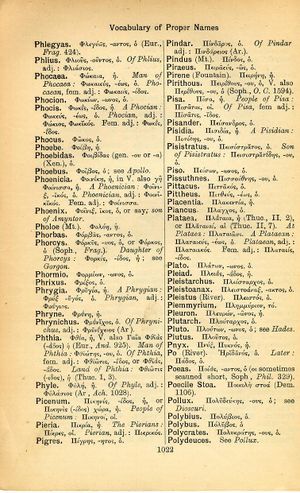Pluto
οὐ γὰρ ἀργίας ὤνιον ἡ ὑγίεια καὶ ἀπραξίας, ἅ γε δὴ μέγιστα κακῶν ταῖς νόσοις πρόσεστι, καὶ οὐδὲν διαφέρει τοῦ τὰ ὄμματα τῷ μὴ διαβλέπειν καὶ τὴν φωνὴν τῷ μὴ φθέγγεσθαι φυλάττοντος ὁ τὴν ὑγίειαν ἀχρηστίᾳ καὶ ἡσυχίᾳ σῴζειν οἰόμενος → for health is not to be purchased by idleness and inactivity, which are the greatest evils attendant on sickness, and the man who thinks to conserve his health by uselessness and ease does not differ from him who guards his eyes by not seeing, and his voice by not speaking
English > Greek (Woodhouse)
Latin > English (Lewis & Short)
Plūto: or Plūton, ōnis, m., = Πλούτων,
I the king of the Lower World, the husband of Proserpine, and brother of Jupiter and Neptune, Cic. N. D. 2, 26, 66; Hyg. praef.; Verg. A. 7, 327; Juv. 13, 50.—Acc. Gr. Plutona, Hor. C. 2, 14, 7.—Hence,
II Plūtōnĭus, a, um, adj., of or belonging to Pluto, Plutonian: et domus exilis Plutonia, i. e. the realms. of death, the Lower Regions, Hor. C. 1, 4, 17.—Subst.: Plūtō-nĭa, ōrum, n. plur., a pestilential district in Asia, Cic. Div. 1, 36, 79.
Latin > French (Gaffiot 2016)
Plūtō (-tōn), ōnis, m. (Πλούτων), Pluton [fils de Saturne et d’Ops, frère de Jupiter et de Neptune, dieu des enfers] : Cic. Nat. 2, 66 ; Virg. En. 7, 327

